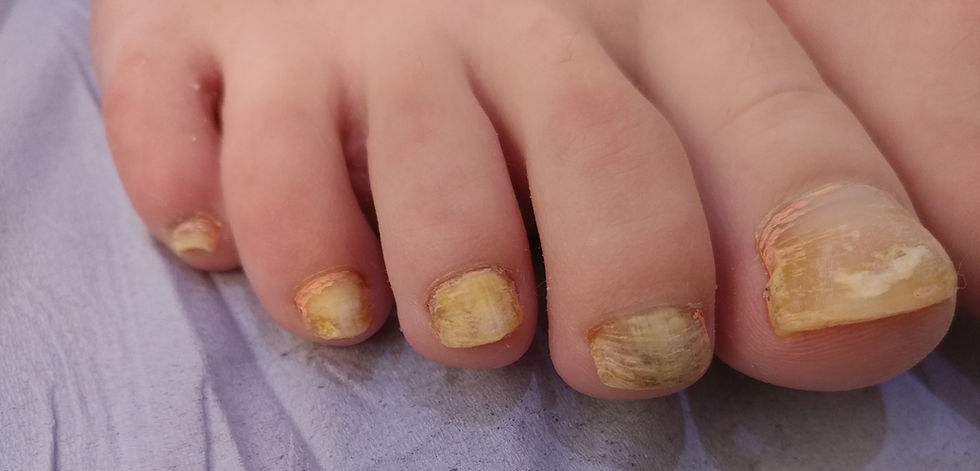Understanding and Overcoming Toenail Fungus in London
- marionwcyau
- Mar 14, 2024
- 2 min read
Updated: Mar 26, 2024

Reasons for Developing Persistent Fungal Nail Infections:
● Weakened Immunity – Certain illnesses like diabetes or medications used after organ transplants can impair immune function. This diminishes the body’s defenses against invading pathogens allowing fungal overgrowth under nails.
● Poor Foot Hygiene – Failing to properly wash feet daily, dry thoroughly between toes after bathing, or rotate moisture-wicking shoes leads to fungal spread to nails. Trim nails straight across to avoid ingrown edges that compound risk.
● Tight, Enclosed Footwear – Non-breathable shoes that exert pressure on toenails spur tiny cracks enabling easier access to inner nail layers for fungi. This worsens the occurrence and stubbornness.
● High Impact Sports – Running, football, tennis and dance involve intense repetitive trauma that takes a major toll on toenails. Such microscopic damage raises susceptibility to onset and recurrence.
● Shared Showers, Locker Rooms – Using public showers, pools and locker rooms means bare feet contact with damp surfaces laden with fungal spores. Shower shoes lower this transmission route.
● Impaired Blood Flow – Numbing neuropathy, peripheral vascular disease or foot injuries diminish blood circulation. This impedes immune cells from reaching and fighting infections under the toenails.
● Skin Injuries – Cuts or wounds on feet coming into contact with moisture permit rapid entry of opportunistic infections like fungi into vulnerable tissue. Keep feet protected.
Evaluating Suspected Cases of Toenail Fungus
Getting an accurate diagnosis is vital for successful toenail fungus treatment in London. Our podiatric specialists utilise advanced techniques to confirm an active infection and identify the precise organism involved:
● Microscopic Analysis – Microscopic inspection of nail clippings/scrapings detects the presence of hyphae - the spreading filaments of invasive fungal growth.
● Fungal Culture – Lab testing grows nail samples in optimal mediums to isolate organisms based on characteristics helping target medications.
● Specialty Stains – Stains distinguish fungal overgrowth from other common nail issues like psoriasis, eczema and nail trauma.
● Blood Tests – Systemic blood panels aid diagnosis by detecting contributory factors like diabetes, anaemia or impaired immunity.
● Diagnostic Imaging – X-rays visualise damage from advancing infection and rule out other potential causes of nail problems.
● PCR Testing – Samples undergo polymerase chain reaction amplification to accurately pinpoint genetic traces of fungal strains present down to the species.
Once the exact nature and stage of a toenail fungus case is confirmed through exhaustive testing above, a fully customised plan for toenail fungus treatment in London can commence.
With years of combined podiatric experience specifically focused on fungal nail infections, our London clinic's team looks forward to helping you finally overcome frustrating toenail fungus for good! We invite you to book a personalised consultation to get started today on the path back to clear, beautiful nails free of discomfort.









Comments